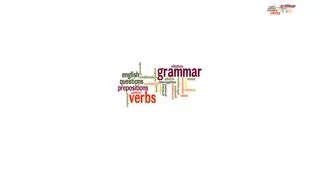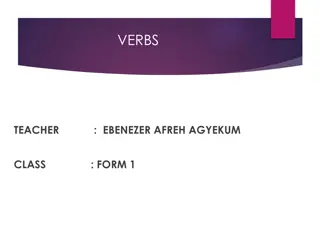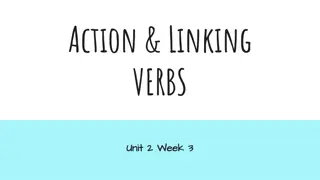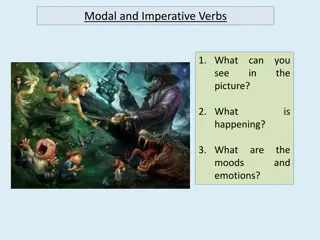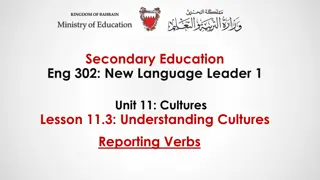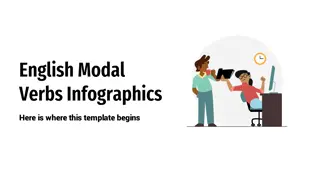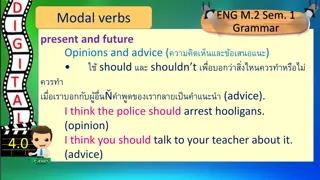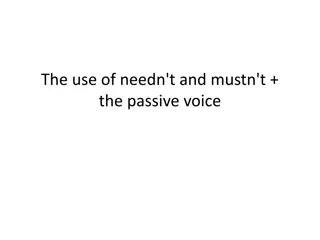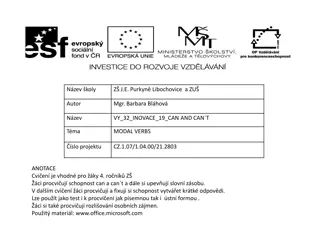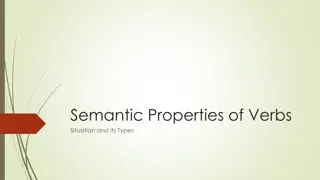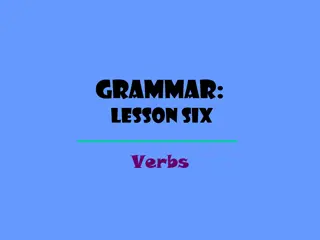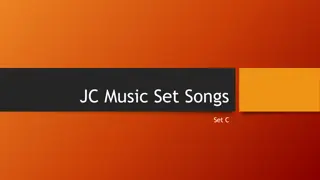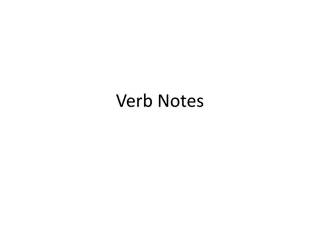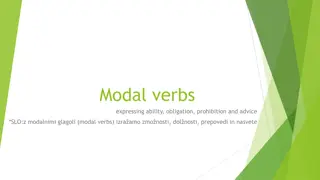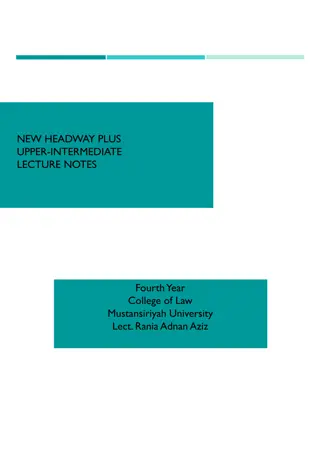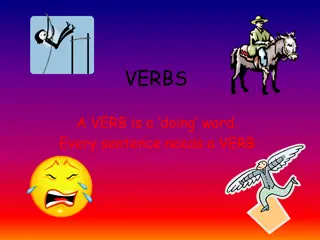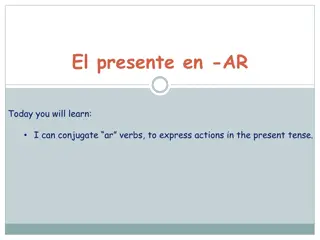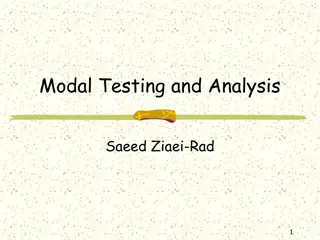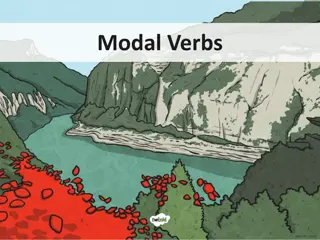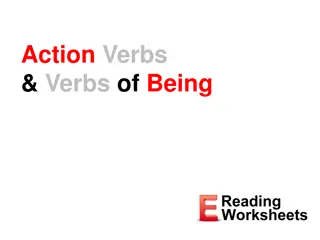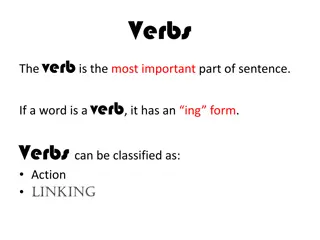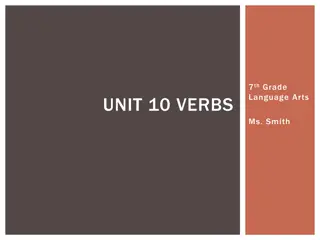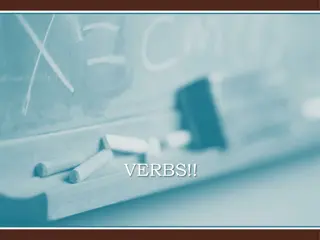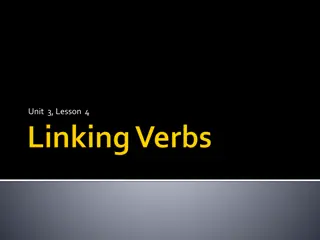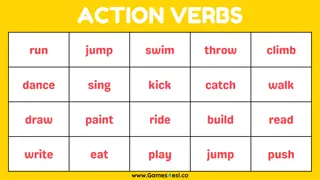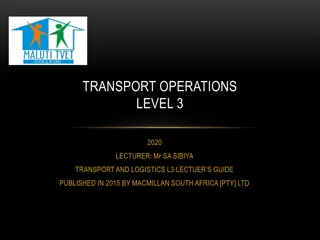Dos & Don'ts: Traffic Signs and Modal Verbs
Learn the meaning of traffic signs and practice using modal verbs in this English lesson. Improve your reading, listening, and writing skills.
8 views • 33 slides
MAKING RECOMMENDATIONS
Providing recommendations is a crucial skill in both spoken and written English, especially for tasks like formal essays, reports, proposals, and letters. This guide covers different ways to give recommendations using modal verbs, passive voice, gerunds, and more. Get insights on modal/semi-modal ve
5 views • 16 slides
Understanding Verbs: Action vs. State, Dynamic vs. Stative
Verbs are essential in sentences, describing actions or states of subjects. They can convey a sense of action like running or state like being. The distinction between dynamic (action) and stative (non-action) verbs is crucial, with dynamic verbs being used in continuous tenses and stative verbs des
0 views • 31 slides
Understanding Modal Verbs in English
Modal verbs, also known as modals, are auxiliary verbs that express attitudes and levels of certainty in English. They serve various purposes, such as indicating certainty, ability, permission, and making requests. Modal verbs like can, could, may, might, will, would, must, shall, should, and ought
0 views • 19 slides
Understanding Verbs: Introduction and Identification in English
This lesson introduces verbs in English, covering their meaning, identification, and categorization into linking and action verbs. Students will learn to identify verbs in sentences, distinguish linking verbs from action verbs, and understand the importance of verbs in forming meaningful sentences.
0 views • 19 slides
Understanding Modal Verbs: Epistemic and Deontic Uses
Modal verbs, such as can, could, may, must, will, and should, play a crucial role in expressing modality in English. This content discusses the epistemic and deontic uses of modal verbs, illustrating how they convey likelihood, ability, permission, suggestions, obligations, and advice. Explore the n
0 views • 34 slides
Understanding Action and Linking Verbs in Sentences
In this unit, you will delve into the essential concepts of action and linking verbs. Action verbs portray activities, while linking verbs connect the subject to its description. Discover tricks to differentiate between the two types of verbs and learn about predicate nominatives in sentence structu
0 views • 7 slides
Understanding Modal and Imperative Verbs: Usage and Examples
This content covers the explanation and examples of modal verbs, which express certainty, possibility, and obligation, as well as imperative verbs that denote commands and orders. Learn to identify and use these verb types accurately and creatively through practical examples and engaging activities.
1 views • 12 slides
Mastering Reported Verbs: Understanding and Application
Dive into the intricacies of reported verbs in English language. Explore how to transform direct speech into reported speech using different reporting verbs. Learn about verbs like 'offer', 'promise', 'invite', 'consider', and 'deny' in reported speech structures. Practice reporting the bold parts o
0 views • 9 slides
Understanding Irish Verbs: Grammar Basics and Rules
Learn about Irish verbs, including what verbs are, how to conjugate them, the syntax/order of words in sentences, regular and irregular verbs, as well as broad and slender verbs. Explore examples and images to enhance your understanding of Irish grammar.
1 views • 9 slides
Understanding English Modal Verbs: A Visual Guide
Explore the world of English modal verbs through engaging infographics covering must, can, may/might, could, and should. Learn about their usage in sentences and grasp the nuances of expressing ability, permission, obligation, and possibility. Dive into the explanations with visual aids depicting sc
0 views • 33 slides
Understanding Modal Verbs in English Grammar
Explore the nuances of modal verbs in English grammar through opinion, advice, and exercises. Learn how to use modal verbs like should, ought to, can, must, and may in present and future contexts. Enhance your language skills with examples and exercises highlighting the correct usage of modal verbs.
0 views • 12 slides
Effective Use of "Needn't" and "Mustn't" in Passive Voice
Understanding when to use "needn't" and "mustn't" in the passive voice can enhance your language skills. "Needn't" is used to express lack of necessity, while "mustn't" indicates prohibition or strong advice. Incorporating these modal verbs in the passive voice adds depth and clarity to your communi
0 views • 4 slides
Modal Verbs Exercise - Can and Can't Practice Activities
Enhance students' ability to use modal verbs can and can't through engaging exercises focusing on forming questions and short answers. Utilize the provided images to prompt students to complete sentences and questions with appropriate modal verbs.
0 views • 5 slides
Understanding Semantic Properties of Verbs in English Language
Explore the semantic properties of English verbs through various examples and classifications. Discover how verbs like hit, kiss, and touch share common properties, while verbs like make, create, imagine, and build belong to different classes based on their semantic relationships. Delve into the gra
0 views • 17 slides
Understanding Verbs: Types and Usage in Grammar
Learn about verbs in grammar through this detailed lesson, covering action verbs, linking verbs, and helping verbs. Explore examples and practice identifying different types of verbs in sentences. Enhance your understanding of how verbs express action, state of being, and help form complete verb phr
0 views • 15 slides
Overview of Sacred Music: Plainchant, Gregorian Chant, and Modal Music
Delve into the world of sacred music with a focus on Plainchant, Gregorian Chant, and Modal Music. Explore the history, characteristics, and unique features of these musical forms, ranging from the reverent tones of Salve Regina to the intriguing melodies of Modal Music. Discover the textures, moods
0 views • 10 slides
Understanding Action, Linking, and Helping Verbs
This content provides detailed notes on action, linking (dead verbs), and helping (auxiliary) verbs. It explains how to identify each type of verb and provides examples for practice, along with helpful tips on distinguishing between linking and action verbs. The visuals and explanations make learnin
0 views • 19 slides
Understanding Modal Verbs for Ability, Obligation, Prohibition, and Advice
Modal verbs play a crucial role in expressing ability, obligation, prohibition, and advice in English. They help convey various nuances in meaning such as capability, necessity, restrictions, and suggestions. By exploring modal verbs like "can", "could", "must", and others, you can develop a deeper
0 views • 9 slides
Understanding Verbs: Unit 1 Lecture Notes - New Headway Plus Upper-Intermediate
Dive into Unit 1 lecture notes of New Headway Plus Upper-Intermediate focusing on the tense system, auxiliary verbs, main verbs like Be, Do, Have, modal auxiliaries, differentiating between auxiliaries and full verbs, and understanding verb forms through examples.
0 views • 11 slides
Exploring Finite and Non-Finite Verbs in English Grammar
This content introduces the concept of finite and non-finite verbs in English grammar through examples and explanations. It covers the definitions, identification, and usage of finite and non-finite verbs, with practical examples provided for better understanding. The tips mentioned help in distingu
0 views • 20 slides
Explore Verbs: Learning the Action Words
Discover the importance of verbs as action words in sentences through engaging activities. Identify verbs in sentences, select verbs from a list of words, and practice adding verbs to incomplete sentences. Enhance your understanding of verbs and improve your grammar skills in a fun way!
0 views • 6 slides
Mastering Present Tense Conjugation of -AR Verbs in Spanish
Dive into the world of conjugating -AR verbs in Spanish to express actions in the present tense. Learn about the fundamental parts of Spanish verbs, including the infinitive, ending, and stem. Discover how to conjugate regular -AR verbs like hablar (to speak) through detailed explanations and verb c
0 views • 36 slides
Understanding Verb Phrases: Main and Helping Verbs Explained
Learn about verb phrases composed of main and helping verbs, with examples like "might have eaten" and "will read." Discover words that can function as both main and helping verbs, and understand when helping verbs can be separate from main verbs in a sentence. Explore the nuances of verb usage for
0 views • 30 slides
Understanding Modal Verbs in Grammar - Mega Goals 6 Unit 1 Everyone Makes Mistakes
Modal verbs play a crucial role in expressing abilities, possibilities, and obligations in English grammar. This lesson from Mega Goals 6 Unit 1 covers modal verbs, passive voice, and past models, offering a comprehensive overview through various activities and examples.
0 views • 25 slides
Understanding Modal Testing and Analysis in Structural Dynamics
Modal testing and analysis play a crucial role in understanding the behavior of structural systems under various conditions like undamped, viscously damped, and hysterically damped scenarios. This analysis involves the study of single-degree-of-freedom systems, undamped systems for free and forced v
0 views • 23 slides
Study on Vitality of Primary Latvian Verbs: A Diachronic Analysis
Primary Latvian verbs are derived from roots preserved in verbs, nouns, or adjectives. Some verbs have disappeared, and factors like semantics and morphology may have influenced their preservation. The study analyzed 461 primary verbs to understand the reasons behind their preservation or disappeara
0 views • 22 slides
Spanish 1 - Learning to Conjugate -ar Verbs
In this lesson, you will learn to conjugate -ar verbs in Spanish. The content covers identifying correct verb conjugations, answering questions using -ar verbs, and recognizing subjects based on verb conjugation. You will also practice with a list of common -ar verbs and learn the conjugation patter
0 views • 17 slides
Understanding Modal Verbs: Usage and Examples
Modal verbs are auxiliary verbs that are used in conjunction with main verbs to express various meanings such as possibility, likelihood, necessity, and more. Common modal verbs include may, must, could, should, and will. They play a crucial role in indicating the level of certainty or permission in
0 views • 16 slides
Understanding Modal Verbs in English
Modal verbs in English such as 'must', 'have to', 'mustn't', and 'don't have to' are used to express obligations, prohibitions, and lack of necessity. 'Must' and 'have to' convey internal and external obligations, while 'mustn't' indicates prohibition and 'don't have to' implies lack of necessity. E
0 views • 14 slides
Understanding Action Verbs and Verbs of Being
Explore the differences between action verbs and verbs of being through examples and explanations. Learn how action verbs express actions, while verbs of being indicate a state of being. Delve into forms of "be" and practice with more examples to deepen your understanding of these fundamental gramma
0 views • 10 slides
Understanding Verbs: The Key Elements in Sentence Structure
Verbs are essential components of sentences, with both action and linking verbs. They can form verb phrases with helping verbs and may be interrupted by adverbs. A substitution test involving forms of "to be" can help differentiate linking and action verbs. Explore the nuances of verbs in sentence c
0 views • 4 slides
Understanding Verbs in 7th Grade Language Arts with Ms. Smith
Learn about action verbs, transitive and intransitive verbs, verbs with indirect objects, linking verbs, predicate verbs, and tenses in Unit 10 with Ms. Smith. Explore examples and explanations to enhance your verb knowledge and language skills.
0 views • 8 slides
Understanding Verbs: Types and Usage
Verbs are essential in forming statements and expressing action or states of being. They can show time through different tenses such as past, present, and future. Action verbs depict physical or mental actions, while linking verbs connect the subject with a noun, pronoun, or adjective. Verb phrases
0 views • 8 slides
Understanding Verbs: Types and Forms in English Grammar
Verbs in English grammar play a crucial role in expressing actions and states. They can be classified into various types such as action verbs, linking verbs, main verbs, auxiliary verbs, transitive verbs, intransitive verbs, and phrasal verbs. Verbs have six forms including base form, infinitive, pa
0 views • 13 slides
Understanding Phrasal Verbs in English Language Courses
The content discusses the concept of phrasal verbs in English language, particularly focusing on the differences between verbs and phrasal verbs. It explains that phrasal verbs are combinations of verbs and adverbs or prepositions that convey specific meanings. Examples and explanations of various p
0 views • 9 slides
Understanding Linking Verbs in English Grammar
Learn about linking verbs in English grammar. Discover how linking verbs connect the subject of a sentence with a word in the predicate. Differentiate between action verbs and linking verbs with examples. Explore common linking verbs and their role in sentence structure. Enhance your understanding o
0 views • 14 slides
Explore a Variety of Verb Activities with Games4esl.co
Dive into the world of verbs with a collection of images showcasing action verbs, daily routine verbs, school verbs, housework verbs, travel verbs, body movement verbs, cooking verbs, sports and exercise verbs, emotion verbs, and social verbs. Enhance your vocabulary and language skills through enga
0 views • 10 slides
Understanding Multi-Modal Transportation in Logistics
The content covers concepts such as inter-modal and multi-modal transportation, seamless supply chains, standard containers, swap bodies, cellular container ships, and unaccompanied road semi-trailers in the context of transportation operations. It explains the meanings and functions of various mode
0 views • 14 slides
Effective Language Learning: Vocabulary, Grammar, and Modal Verbs Activities
Enhance your language skills with engaging vocabulary exercises, definitions matching, and practice with modal verbs. Dive into a variety of educational tools, improve your understanding with video explanations and PDFs, and master different types of present modal verbs. Elevate your language learni
0 views • 16 slides


